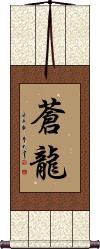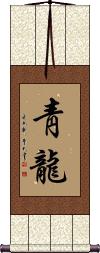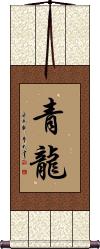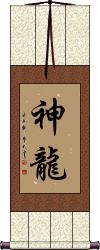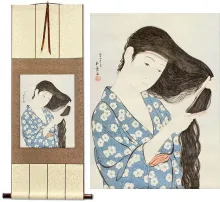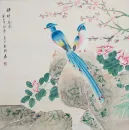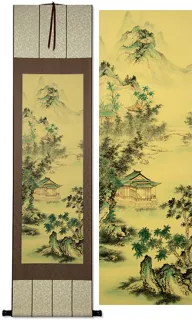Many custom options...
And formats...

Blue Dragon in Chinese / Japanese...
Buy a Blue Dragon calligraphy wall scroll here!
Personalize your custom “Blue Dragon” project by clicking the button next to your favorite “Blue Dragon” title below...
Blue Dragon
Green Dragon / Blue Dragon
靑龍 is a title that can mean blue or green dragon.
The first character can mean blue, green, azure, or celadon.
The second character means dragon.
This is mostly a Chinese title (especially in Buddhism). It will be understood but less commonly used in Japanese and Korean.
Blue Dragon / Azure Dragon
青龍 is a scholarly title for “Blue Dragon” or “Azure Dragon.”
You'll find this title used in ancient Chinese literature and astronomy. This dragon has dominion over the eastern sky or eastern heavens. The Azure Dragon is also noted for representing the spring season. Also seen as an auspicious omen.
Emperor Huizong of the Song Dynasty canonized the five colored dragons as “kings.” The Azure Dragon represents the most compassionate of kings.
In Japanese, this title is known with the same meaning but can also be a given name, Seiryuu or Seiryu.
Note, the first character can be written as ![]() OR
OR ![]() . Same character, just two ways to write it.
. Same character, just two ways to write it.
Shen Long
神龍 or Shen Long literally means “god dragon” or “divine dragon.”
神龍 is a spiritual dragon from Chinese mythology that controls wind, storms, clouds, and rain. Historically, farmers in China avoid offending this dragon, as it could result in a drought or flooding of their fields.
Shen Long has blue/azure scales and appears on the beautiful robes of some Chinese emperors.
Sometimes romanized as Shen Lung and sometimes written as 神竜 in Japan with the pronunciation of Shinryū or Shenron. It can also be a given name in Japan.
This in-stock artwork might be what you are looking for, and ships right away...
Gallery Price: $108.00
Your Price: $59.88
Gallery Price: $72.00
Your Price: $39.88
Gallery Price: $72.00
Your Price: $39.88
Beautiful Blue and Gold Chinese Birds & Flowers Painting
Discounted Blemished
Gallery Price: $71.00
Your Price: $39.00
Gallery Price: $72.00
Your Price: $39.88
Gallery Price: $63.00
Your Price: $34.88
Gallery Price: $268.00
Your Price: $148.88
Gallery Price: $101.00
Your Price: $55.88
Gallery Price: $63.00
Your Price: $34.88
Gallery Price: $63.00
Your Price: $34.88
Gallery Price: $101.00
Your Price: $55.88
Gallery Price: $83.00
Your Price: $45.88
Gallery Price: $72.00
Your Price: $39.88
Gallery Price: $72.00
Your Price: $39.88
Not the results for Blue Dragon that you were looking for?
Below are some entries from our dictionary that may match your Blue Dragon search...
| Characters If shown, 2nd row is Simp. Chinese |
Pronunciation Romanization |
Simple Dictionary Definition |
蒼龍 苍龙 see styles |
cāng lóng cang1 long2 ts`ang lung tsang lung souryuu / soryu そうりゅう |
More info & calligraphy: Blue Dragon(1) blue dragon; (2) Azure Dragon (god said to rule over the eastern heavens); (3) (astron) seven mansions (Chinese constellations) of the eastern heavens; (4) large horse with a bluish-leaden coat; (5) shape of an old pine tree; (given name) Souryū |
靑龍 靑龙 see styles |
qīng lóng qing1 long2 ch`ing lung ching lung |
More info & calligraphy: Green Dragon / Blue Dragon |
文殊 see styles |
wén shū wen2 shu1 wen shu monju もんじゅ |
Manjushri, the Bodhisattva of keen awareness (Buddhist term) Manjushri; Manjusri; Bodhisattva that represents transcendent wisdom; (p,s,f) Monju (文殊師利) Mañjuśrī 滿殊尸利 -later 曼殊室利. 文殊 is also used for Mañjunātha, Mañjudeva, Mañjughoṣa, Mañjuṣvara, et al. T., hjamdpal; J., Monju. Origin unknown; presumably, like most Buddhas and bodhisattvas, an idealization of a particular quality, in his case of Wisdom. Mañju is beautiful, Śrī; good fortune, virtue, majesty, lord, an epithet of a god. Six definitions are obtained from various scriptures: 妙首 (or 頭 ) wonderful or beautiful) head; 普首 universal head; 濡首 glossy head (probably a transliteration); 敬首 revered head; 妙德 wonderful virtue (or power); 妙吉祥 wonderfully auspicious; the last is a later translation in the 西域記. As guardian of wisdom 智慧 he is often placed on Śākyamuni's left, with 普顯 on the right as guardian of law 理, the latter holding the Law, the former the wisdom or exposition of it; formerly they held the reverse positions. He is often represented with five curls or waves to his hair indicating the 五智 q. v. or the five peaks; his hand holds the sword of wisdom and he sits on a lion emblematic of its stern majesty: but he has other forms. He is represented as a youth, i. e. eternal youth. His present abode is given as east of the universe, known as 淸涼山 clear and cool mountain, or a region 寶住 precious abode, or Abode of Treasures, or 寶氏 from which he derives one of his titles, 寶相如來. One of his dhāraṇīs prophesies China as his post-nirvāṇa realm. In past incarnations he is described as being the parent of many Buddhas and as having assisted the Buddha into existence; his title was 龍種上佛 the supreme Buddha of the nāgas, also 大身佛 or 神仙佛; now his title is 歡喜藏摩尼寶精佛 The spiritual Buddha who joyfully cares for the jewel: and his future title is to be 普現佛 Buddha universally revealed. In the 序品 Introductory Chapter of the Lotus Sutra he is also described as the ninth predecessor or Buddha-ancestor of Śākyamuni. He is looked on as the chief of the Bodhisattvas and represents them, as the chief disciple of the Buddha, or as his son 法王子. Hīnayāna counts Śāriputra as the wisest of the disciples, Mahāyāna gives Mañjuśrī the chief place, hence he is also styled 覺母 mother, or begetter of understanding. He is shown riding on either a lion or a peacock, or sitting on a white lotus; often he holds a book, emblem of wisdom, or a blue lotus; in certain rooms of a monastery he is shown as a monk; and he appears in military array as defender of the faith. His signs, magic words, and so on, are found in various sutras. His most famous centre in China is Wu-tai shan in Shansi. where he is the object of pilgrimages, especially of Mongols. The legends about him are many. He takes the place in Buddhism of Viśvakarman as Vulcan, or architect, of the universe. He is one of the eight Dhyāni-bodhisattvas, and sometimes has the image of Akṣobhya in his crown. He was mentioned in China as early as the fourth century and in the Lotus Sutra he frequently appears, especially as the converter of the daughter of the Dragon-king of the Ocean. He has five messengers 五使者 and eight youths 八童子 attending on him. His hall in the Garbhadhātu maṇḍala is the seventh, in which his group numbers twenty-five. His position is northeast. There are numerous sutras and other works with his name as title, e. g. 文殊師利問菩提經 Gayaśīrṣa sūtra, tr. by Kumārajīva 384-417: and its 論 or .Tīkā of Vasubandhu, tr. by Bodhiruci 535. see list in B. N. |
蒼竜 see styles |
souryuu / soryu そうりゅう |
(1) blue dragon; (2) Azure Dragon (god said to rule over the eastern heavens); (3) (astron) seven mansions (Chinese constellations) of the eastern heavens; (4) large horse with a bluish-leaden coat; (5) shape of an old pine tree; (given name) Souryū |
青竜 see styles |
seiryuu / seryu せいりゅう |
(1) blue dragon (an auspicious creature in Chinese mythology); (2) Azure Dragon (god said to rule over the eastern heavens); (surname, given name) Seiryū |
青龍 青龙 see styles |
qīng lóng qing1 long2 ch`ing lung ching lung seiryuu / seryu せいりゅう |
Azure Dragon, one of the four symbols of the Chinese constellations, also known as the Azure Dragon of the East 東方青龍|东方青龙[Dong1 fang1 Qing1 long2] or 東方蒼龍|东方苍龙[Dong1 fang1 Cang1 long2]; (slang) man without pubic hair (1) blue dragon (an auspicious creature in Chinese mythology); (2) Azure Dragon (god said to rule over the eastern heavens); (surname, given name) Seiryū |
優鉢羅 优钵罗 see styles |
yōu bō luó you1 bo1 luo2 yu po lo uhatsura |
utpala, the blue lotus, to the shape of whose leaves the Buddha's eyes are likened; also applied to other water lilies. Name of a dragon king; also of one of the cold hells, and one of the hot hells. Also 優鉢剌; 鄔鉢羅; 漚鉢羅. |
靑龍疏鈔 see styles |
qīng lóng shū chāo qing1 long2 shu1 chao1 ch`ing lung shu ch`ao ching lung shu chao |
Blue Dragon Commentary |
Variations: |
souryou; souryuu / soryo; soryu そうりょう; そうりゅう |
(1) (See 青竜・1) blue dragon; (2) (See 青竜・2) Azure Dragon (god said to rule over the eastern heavens); (3) {astron} (See 二十八宿) seven mansions (Chinese constellations) of the eastern heavens; (4) large horse with a bluish-leaden coat; (5) shape of an old pine tree |
Variations: |
seiryou; shouryou; seiryuu / seryo; shoryo; seryu せいりょう; しょうりょう; せいりゅう |
(1) blue dragon (an auspicious creature in Chinese mythology); (2) (See 四神) Azure Dragon (god said to rule over the eastern heavens) |
The following table may be helpful for those studying Chinese or Japanese...
| Title | Characters | Romaji (Romanized Japanese) | Various forms of Romanized Chinese | |
| Blue Dragon | 蒼龍 苍龙 | cāng lóng cang1 long2 cang long canglong | ts`ang lung tsanglung tsang lung |
|
| Green Dragon Blue Dragon | 靑龍 靑龙 | sei ryū / seiryū | qīng lóng qing1 long2 qing long qinglong | ch`ing lung chinglung ching lung |
| Blue Dragon Azure Dragon | 青龍 / 靑龍 青龙 | sei ryuu / seiryuu / sei ryu | qīng lóng qing1 long2 qing long qinglong | ch`ing lung chinglung ching lung |
| Shen Long | 神龍 | shenron / shinryuu shenron / shinryu | shén lóng shen2 long2 shen long shenlong | shen lung shenlung |
| In some entries above you will see that characters have different versions above and below a line. In these cases, the characters above the line are Traditional Chinese, while the ones below are Simplified Chinese. | ||||
Successful Chinese Character and Japanese Kanji calligraphy searches within the last few hours...
